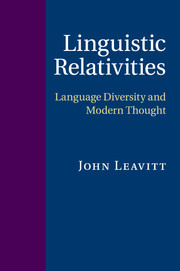Book contents
- Frontmatter
- Contents
- Preface
- Introduction
- 1 A passage to modernity
- 2 One reason, one world, many monads
- 3 The world at war with reason: Britain and France in the eighteenth century
- 4 Multiplicity and the Romantic explosion
- 5 Essences and universals through the nineteenth century
- 6 Boas and the linguistic multiverse
- 7 Linguistic relativity: Sapir, Lee, and Whorf
- 8 The other side of the mirror: a twentieth-century essentialism
- 9 The rise of cognition and the repression of languages
- 10 The return of the repressed
- Conclusion
- Notes
- References
- Index
2 - One reason, one world, many monads
Published online by Cambridge University Press: 04 April 2011
- Frontmatter
- Contents
- Preface
- Introduction
- 1 A passage to modernity
- 2 One reason, one world, many monads
- 3 The world at war with reason: Britain and France in the eighteenth century
- 4 Multiplicity and the Romantic explosion
- 5 Essences and universals through the nineteenth century
- 6 Boas and the linguistic multiverse
- 7 Linguistic relativity: Sapir, Lee, and Whorf
- 8 The other side of the mirror: a twentieth-century essentialism
- 9 The rise of cognition and the repression of languages
- 10 The return of the repressed
- Conclusion
- Notes
- References
- Index
Summary
A brief, and sufficiently accurate, description of the intellectual life of the European races during the succeeding two centuries and a quarter up to our own times is that they have been living upon the accumulated capital of ideas provided for them by the genius of the seventeenth century.
Alfred North Whitehead (Science and the Modern World, 1932; exergue to Chomsky, Cartesian Linguistics)Many writers of the seventeenth century seem to be relaying first glimpses of a new world that is, most extraordinarily of all, simply the world as it is, seen clear for the first time. The articulation of modern experience took different forms in the main philosophical options then established: Descartes' rationalism for the mechanical world and the reasoning mind, the empiricism of Bacon and Locke for experiment upon and interaction with the world, the monadism of Leibniz for the multiplicity and uniqueness of essences and personalities.
Each of these alternatives is closely bound up with a language and style: these authors are part of the heritage of their respective nations and tongues. For rationalists, who tended to be French, reason comes first; for empiricists, who tended to be British, the world comes first. Both of these views are universalistic, seeking general laws that apply everywhere in the same way. In German thinking, on the contrary, the notion of diversity as a positive good came to be a central and developing idea in a mode that I am calling essentialist.
- Type
- Chapter
- Information
- Linguistic RelativitiesLanguage Diversity and Modern Thought, pp. 30 - 53Publisher: Cambridge University PressPrint publication year: 2010

